State Bar V. Nifong: Findings of Fact and Conclusions of Law
Disciplinary Hearing Committee Chair F. Lane Williamson:
The Hearing Committee has deliberated and has reached a unanimous conclusion as to each of the contested issues that have been submitted by the parties. What I'm going to do is to read each of the contested issues that are listed in the Pre-trial Order, and then to indicate "yes" or "no," and in some cases with some explanation, but generally without any further elaboration.
We'll have further elaboration at the conclusion of Phase Two as to certain matters. And bear in mind that there are 19 issues, some of which are duplicative and some of which reflect that there were amendments to the applicable rules during the period we are talking about, so that you'll hear what sounds like pretty much the same thing.A "yes" will signify that we have found the issue to be proved by clear, cogent and convincing evidence, which is the standard of proof applicable to the Bar's allegation.A "no" simply means that there has been a failure or an absence of proof to the standard of clear, cogent and convincing evidence.
The first issue reads as follows:
"Did Defendant make extrajudicial statements to or in the presence of representatives of the news media, including those set forth in paragraphs 12 through 177 of the Amended Complaint?"
Yes.Two: "Did Defendant know or should Defendant reasonably have known that his extrajudicial statements set forth in paragraphs 12 through 177 of the Amended Complaint would be disseminated by means of public communication?"
Yes."Did Defendant know or should Defendant reasonably have known that his extrajudicial statements set forth in paragraphs 12 through 177 of the Amended Complaint would have a substantial likelihood of materially prejudicing an adjudicative proceeding in the matter in violation of Rule 3.6(a)?"
Yes.Four: "Did Defendant's extrajudicial statements set forth in paragraphs 12 through 177 of the Amended Complaint have a substantial likelihood of heightening public condemnation of the accused in violation of Rule 3.8(f) of the Revised Rules of Professional Conduct?"
Yes, with this further note of explanation. It will be necessary for us to have a finding, I believe, that the accused in this instance includes the set of suspects, that being the lacrosse players that were at the house on the night in question. It is not necessary for us to make a finding as a legal matter that they were actually indicted or criminal defendants at the time.Five: "By making misleading statements to or in the presence of representatives of the news media did Defendant engage in conduct involving dishonesty, fraud, deceit or misrepresentation in violation of Rule 8.4(c) of the Revised Rules of Professional Conduct?"No. A word of explanation there. The one statement at issue there involving whether or not condoms might be involved is to our mind no worse that certain others that were not alleged to involve dishonesty, fraud, deceit or misrepresentation in violation of Rule 8.4(c); for instance, the statement to the effect that the accused were not cooperating. And since it was not alleged that those statements involved an 8.4(c) violation, we do not think it is appropriate to pick out this particular one and say that it is.Although we have the option as a matter of law of finding some of the other statements to also include a Rule 8.4(c) violation, we decline to do so.Number Six: "Did Defendant by not providing to the Duke defendants prior to November 16, 2006, a complete report setting forth the results of all tests or examinations conducted by DSI, including the potentially exculpatory DNA test results and evidence, a, fail to make timely disclosure to the Defense of all evidence or information known to him that tended to negate the guilt of the accused in violation of former Rule 3.8(d) of the Revised Rules of Professional Conduct?"
Yes."B"--cell phones off--"B, failed to make a reasonably diligent effort to comply with a legally proper discovery request in violation of former Rule 3.4(d) of the Revised Rules of Professional Conduct?"
Yes."Did Defendant by not providing to the Duke defendants prior to November 16, 2006, memorializations of Dr. Meehan's oral statements concerning the results of all examinations and tests conducted by DSI in written, recorded or any other form, a, fail to make timely disclosure to the Defense of all evidence or information known to him that tended to negate the guilt of the accused in violation of former Rule 3.8(d) of the Revised Rules of Professional Conduct?"The answer is yes, with the proviso that the way that issue number 7 is worded with the word "memorializations" tends to imply that the violation is premised on violation of the Discovery Statute, rather than 3.8(d). We think for purposes of issue 7a it may be more appropriate to call that "communication in any form of Dr. Meehan's oral statements," and not just say "memorializations."
B, 7b, failed to make a reasonably diligent effort to comply with a legally proper discovery request, in violation of former Rule 3.4(d) of the Revised Rules of Professional Conduct?"
That answer is no, based upon the converse of the distinction in "a;" that is, to the extent that that is based upon compliance with the Discovery Statue. At the time, there was evidence that the Attorney General took the position that prosecutors did not have to provide such memorializations, and therefore there is a plausible reliance by the Defendant upon that position at the time, which is no longer the law, of the Attorney General. And that is the basis for saying no to 7b.Eight: "Did Defendant by not providing to the Duke defendants after November 16, 2006, a complete report setting forth the results of all tests or examinations conducted by DSI, including the potentially exculpatory DNA test results in evidence, a, fail after a reasonably diligent inquiry to make timely disclosure to the Defense of all evidence or information required to be disclosed by applicable law, rules of procedure or court opinions, including all evidence or information known to him that tended to negate the guilt of the accused in violation of current Rule 3.8(d) of the Revised Rules of Professional Conduct?"
The answer is yes."B, failed to disclose evidence or information that he knew or reasonably should have known was subject to disclosure under applicable law, rules of procedure or evidence or court opinions in violation of current Rule 3.4(d)(3) of the Revised Rules of Professional Conduct?"
The answer is yes.Nine: "Did Defendant not providing to the Duke defendants after November 16, 2006, memorializations of Dr. Meehan's oral statements concerning the results of all examinations and tests conducted by DSI in written, recorded or any other form, a, fail after a reasonably diligent inquiry to make timely disclosure to the Defense of all evidence or information required to be disclosed by applicable law, rules of procedure or court opinions, including all evidence or information known to him that tended to negate the guilt of the accused in violation of current Rule 3.8(d) of the Revised Rules of Professional Conduct?"
The answer is yes.
"B, failed to disclose evidence or information that he knew or reasonably should have known was subject to disclosure under applicable law, rules of procedure or evidence or court opinion in violation of current Rule 3.4(d)(3) of the Revised Rules of Professional Conduct?"
The answer is yes.Number Ten: "Did Defendant by instructing Dr. Meehan to prepare a report containing positive matches, a, knowingly disobey an obligation under the rules of a tribunal in violation of Rule 3.4(c) of the Revised Rules of Professional Conduct?"
The answer is yes.
"B, request a person other than a client to refrain from voluntarily giving relevant information to another party in violation of Rule 3.4(f) of the Revised Rules of Professional Conduct?"
That answer is no.Eleven: "Did Defendant by representing to the Court that he had provided all potentially exculpatory evidence, a, make false statements of material fact or law to a tribunal in violation of Rule 3.3(a)(1)?"The answer is yes. "B, engage in conduct involving dishonesty, fraud, deceit or misrepresentation in violation of Rule 8.4(c) of the Revised Rules of Professional Conduct?"Twelve: "Did Defendant by representing to opposing counsel that he had provided all potentially exculpatory evidence, a, make false statements of material fact to a third person in the course of representing a client in violation of Rule 4.1?"
The answer is yes.
The answer is yes."B, engage in conduct involving dishonesty, fraud, deceit or misrepresentation in violation of Rule 8.4(c) of the Revised Rules of Professional Conduct?"
The answer is yes.Thirteen: "Did Defendant by representing to the Court that the substance of all Dr. Meehan's oral statements to him concerning the results of all examinations and tests conducted by DSI were included in DSI's report, a, make false statements of material fact or law to a tribunal in violation of Rule 3.3(a)(1)?"
The answer is yes.
"B, engage in conduct involving dishonesty, fraud, deceit or misrepresentation in violation of Rule 8.4(c) of the Revised Rules of Professional Conduct?"
The answer is yes."Did Defendant by representing to opposing counsel that the substance of all Dr. Meehan's oral statements to him concerning the results of all examinations and tests conducted by DSI were included in DSI's report, a, make false statements of material fact to a third person in the course of representing a client in violation of Rule 4.1?"
Yes.
"B, engage in conduct involving dishonesty, fraud, deceit or misrepresentation in violation of Rule 8.4(c) of the Revised Rules of Professional Conduct?"
The answer is yes.Fifteen: "Did Defendant by representing or implying to the Court at the beginning of the December 15, 2006, hearing that he was not aware of the potentially exculpatory DNA results or alternatively was not aware of their exclusion from DSI's report, a, make false statements of material fact or law to a tribunal in violation of Rule 3.3(a)(1)?"
The answer is yes.
"B, engage in conduct involving dishonesty, fraud, deceit or misrepresentation in violation of Rule 8.4(c) of the Revised Rules of Professional Conduct?"
The answer is yes."Did Defendant by representing to the Grievance Committee of the State Bar that the agreement with Brian Meehan to limit the information in DSI's report was based on privacy concerns of releasing the names and DNA profiles of individuals providing known reference specimens, a, knowingly make a false statement of material fact in connection with a disciplinary matter in violation of Rule 8.1(a)?"
The answer is no.
"B, engage in conduct involving dishonesty, fraud, deceit or misrepresentation in violation of Rule 8.4(c)?"
The answer is no.15 Seventeen: "Did Defendant by representing to the Grievance Committee of The State Bar that he did not realize that the potentially exculpatory DNA test results were not included in DSI's report when he provided it to the Duke defendants or thereafter, a, knowingly make a false statement of material fact in connection with a disciplinary matter in violation of Rule 8.1(a)?"
The answer is yes.
"B, engage in conduct involving25 dishonesty, fraud, deceit or misrepresentation in violation of Rule 8.4(c)?"
The answer is yes.Eighteen: "Did Defendant by representing to the Grievance Committee of the State Bar that his statements to the Court at the beginning of the December 15 hearing referred not to the existence of the potentially exculpatory DNA test results but to the Duke defendants' purported allegation that an intentional attempt had been made to conceal such evidence, a, knowingly make false statements of a material fact in connection with a disciplinary matter in violation of Rule 8.1(a)?"
The answer is yes."B, engage in conduct involving dishonesty, fraud, deceit or misrepresentation in violation of Rule 8.4(c)?"
The answer is yes.Here I wish to note the consensus of the Hearing Committee in regard to those issues that I have just read involving misrepresentations by the Defendant in his response to the Grievance Committee, we have some concern that those charges more or less as a matter of policy are perhaps not warranted from the standpoint that we have concerns that it is very rare that persons are charged with making false statements to the Grievance Committee in their responses, and that if defendants are charged with that, it may have a chilling effect upon defendants or respondents making a full and complete disclosure to Grievance Committee complaints if they are afraid that, well, if you just disagree with what I tell you, and that if we go to trial and I lose, then by necessity I have misrepresented something to you, that that is perhaps unwise as a matter of a policy. Nevertheless, it is alleged here, and we do find that in certain instances there were violations. But we would simply note that in this particular case it may be at least in our view something of an instance of overcharging.Nineteen: "Did Defendant through one of more of the above violations engage in conduct prejudicial to the administration of justice in violation of Rule 8.4(d)?"
The answer is yes.
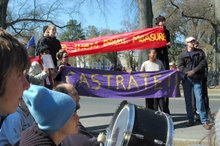




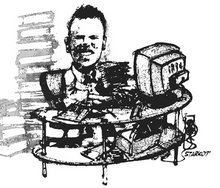
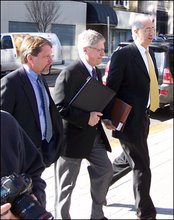
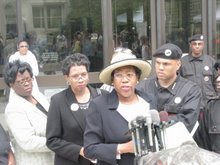
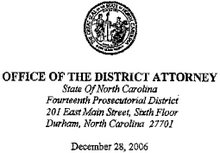
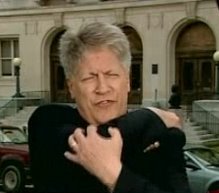

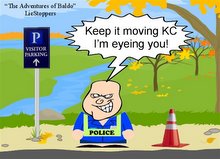

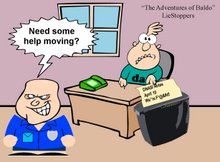
















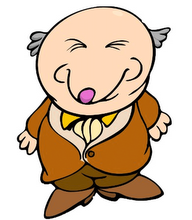
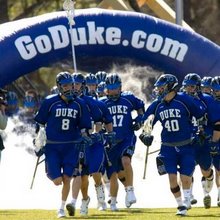

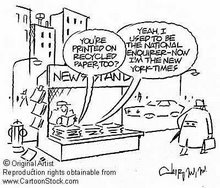

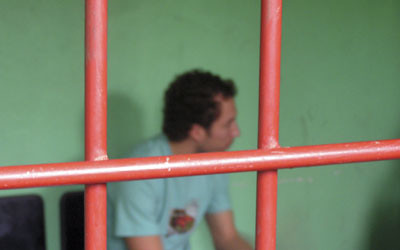
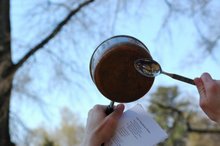


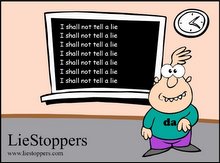






2 comments:
OK, I may need some help understanding point Five:
"The one statement at issue there involving whether or not condoms might be involved is to our mind no worse that certain others that were not alleged to involve dishonesty, fraud, deceit or misrepresentation in violation of Rule 8.4(c); for instance, the statement to the effect that the accused were not cooperating. And since it was not alleged that those statements involved an 8.4(c) violation, we do not think it is appropriate to pick out this particular one and say that it is.
Although we have the option as a matter of law of finding some of the other statements to also include a Rule 8.4(c) violation, we decline to do so."
Is it my imagination or is that saying, in effect, "we're not going to find him guilty of 'dishonesty, fraud, deceit or misrepresentation' because, although he made several statements which a reasonable person would say fit that description, the one which he was actually charged with wasn't the worst example?" I must be missing something; I could understand if it had been something like "The only statement specifically identified as being a possible violation of 8.4(c) is one where his excuse that he was just offering a hypothetical, while flimsy, is just enough to cover him. And although we think other statements he made were more egregious, he wasn't charged with those and we can't retroactively tailor charges to what our ruling on those charges would be." But no matter how many times I read this one, it still seems to be saying "because other statements he made were worse, we can't hold him accountable for how bad the statements he was charged on."
I've never posted here & I have a question that may already have been answered: who are the people pictured in the "Castrate" photograph? Have they identified themselves/been identified?
Post a Comment